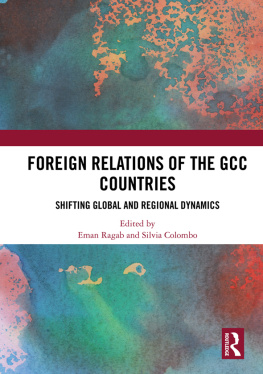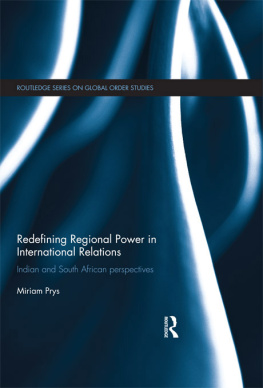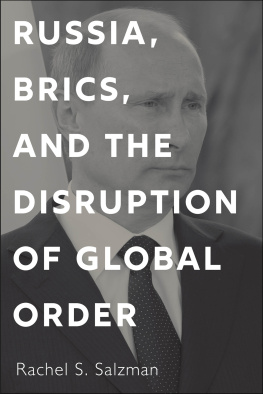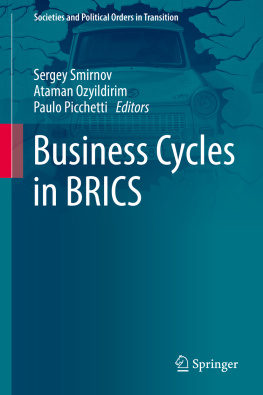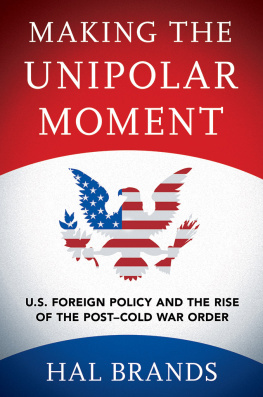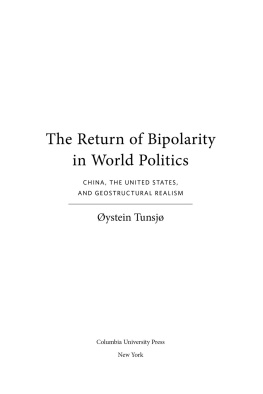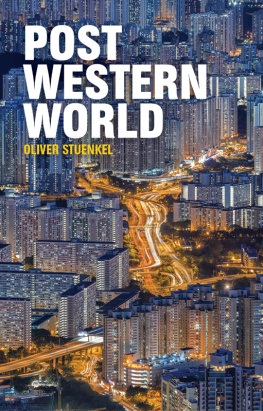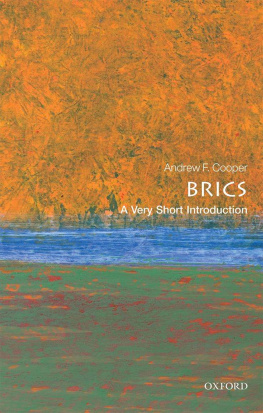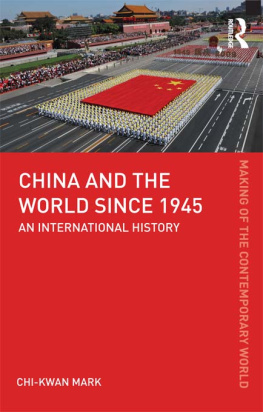THE BRICS SUPERPOWER CHALLENGE
The BRICs Superpower Challenge
Foreign and Security Policy Analysis
KWANG HO CHUN
Chonbuk National University, Korea
ASHGATE
Kwang Ho Chun 2013
All rights reserved. No part of this publication may be reproduced, stored in a retrieval system or transmitted in any form or by any means, electronic, mechanical, photocopying, recording or otherwise without the prior permission of the publisher.
Kwang Ho Chun has asserted his right under the Copyright, Designs and Patents Act, 1988, to be identified as the author of this work.
Published by
Ashgate Publishing Limited
Wey Court East
Union Road
Farnham
Surrey, GU9 7PT
England
Ashgate Publishing Company
110 Cherry Street
Suite 3-1
Burlington, VT 05401-3818
USA
www.ashgate.com
British Library Cataloguing in Publication Data
A catalogue record for this book is available from the British Library
The Library of Congress has cataloged the printed edition as follows:
Chun, Kwang Ho.
The BRICs superpower challenge : foreign and security policy analysis / by Kwang Ho Chun.
pages cm
ISBN 978-1-4094-6869-1 (hardback : alk. paper) ISBN 978-1-4094-6870-7 (ebook) ISBN 978-1-4094-6871-4 (epub) 1. World politics21st century. 2. Security, International. 3. BrazilForeign relations21st century. 4. Russia (Federation)Foreign relations21st century. 5. IndiaForeign relations21st century. 6. ChinaForeign relations21st century. I. Title.
JZ1310.C495 2013
327dc23
2013021069
ISBN 9781409468691 (hbk)
ISBN 9781409468707 (ebk-PDF)
ISBN 9781409468714 (ebk-ePUB)
Contents
Acknowledgements
I would like to thank all those who helped me to complete this research. My thanks go to Dr Chungwon Choue, who first inspired me on this topic and in starting my research, Prof. Dr Luc Reychler of Katholieke Universiteit Leuven, Prof. Dr Andr-Paul Frognier of Universit Catholique de Louvain, Prof. Christoph Bluth of the University of Leeds and Prof. Hazel Smith of the Woodrow Wilson Center. They all helped me develop and polish my ideas regarding this research topic through valuable comments and constructive criticism. I would particularly like to express my whole-hearted gratitude to my lifetime adviser, Dr Chungwon Choue. I am equally grateful to Dr Guh Suk Seo, the President of Chonbuk National University, Korea for his financial and undoubted support and trust in me as a researcher. They ceaselessly encouraged and stimulated my work with a great deal of kindness and endurance during my research.
I also wish to acknowledge the assistance of those who offered me valuable comments on the text, including my editor, Brian Austerfield of the University of Central Lancashire.
This research required an enormous amount of material and a number of occasions for practical observation of the BRICs countries. The Royal United Service Institute, the International Institute for Strategic Studies and University of Central Lancashire helped me greatly in this matter. I would like to extend my warm gratitude to members of all these research centres and many others.
Finally, I also would like to take this opportunity to express my deepest love to my family, Dr Sung Eun Kim and Hyung Mo. The completion of this work in England was possible only thanks to my familys full-time support, endurance and sacrifice.
List of Abbreviations
APEC | Asia-Pacific Economic Cooperation |
ARF | ASEAN Regional Forum |
ASCM | anti-ship cruise missile |
ASEAN | Association of South East Asian Nations |
ASEM | AsiaEurope Meeting |
ASF | African Support Force |
AU | African Union |
BNDES | Brazilian Development Bank |
BRICs | Brazil, Russia, India and China |
C4ISR | command, control, communications, computers, intelligence, surveillance and reconnaissance |
CIS | Commonwealth of Independent States |
CNO | computer network operation |
CTR | Cooperative Threat Reduction |
DDG | guided-missile destroyer |
EAS | East Asia Summit |
EU | European Union |
FDI | foreign direct investment |
FOCAC | Forum on ChinaAfrica Cooperation |
FOCALAE | Forum for East AsiaLatin America Cooperation |
GATT | General Agreement on Tariffs and Trade |
GDP | gross domestic product |
GICNT | Global Initiative to Combat Nuclear Terrorism |
ICBM | inter-continental ballistic missile |
IMF | International Monetary Fund |
IR | international relations |
IRC | International Relations Center |
ISS | International Institute for Strategic Studies |
ISTC | International Science and Technology Center |
LACM | land attack cruise missile |
MIC | military-industrial complex |
MPC&A | Materials Protection, Control and Accounting |
MTCR | Missile Technology Control Regime |
NCO | non-commissioned officer |
NGO | non-governmental organization |
NPT | Nuclear Non-Proliferation Treaty |
NRF | NATO Response Force |
NSG | Nuclear Suppliers Group |
OAS | Organization of American States |
OPCW | Organisation for the Prohibition of Chemical Weapons |
OSCE | Organization for Security and Co-operation in Europe |
PLA | Peoples Liberation Army |
PLAAF | Peoples Liberation Army Air Force |
PLAN | Peoples Liberation Army Navy |
PRC | Peoples Republic of China |
RATS | Regional Anti-Terrorist Structure |
SAM | surface-to-air missile |
SCO | Shanghai Cooperation Organization |
SLBM | sea-launched ballistic missile |
SRBM | short-range ballistic missile |
UAV | unmanned aerial vehicle |
UNASUR | Union of South American Nations |
UNSC | United Nations Security Council |
WTO | World Trade Organization |
Part I
Background
Chapter 1
Introduction
Introduction
Since the collapse of the USSR in the early 1990s, the United States has been enjoying a dominant position in the global power system as the sole superpower nation. However, there have been arguments by some international relations (IR) and political science academics and commentators to the effect that the US may not continue as the worlds sole superpower in the near future; rather, a power shift is likely to be witnessed as some of the contemporary major powers step up their resources and power games to become major forces in the global arena. At the dawn of the twenty-first century, some economic analysts, led by Goldman Sachs, noted the rapid pace with which the economies of the BRICs countries (an acronym for Brazil, Russia, India and China) were growing and noted that in the near future, their economies will have overtaken most of the current major world powers. This revelation heightened the debate that had been under way among IR academics and analysts about the future of the BRICs in the global power system, and in particular what the future might hold for them. It is a debate that remains highly controversial to date.
Next page


